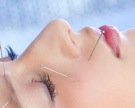A recent study of 80 patients with chronic rhinitis concludes that acupuncture is an effective treatment therapy. Persistent allergic rhinitis affects approximately 30 percent of the global population. Western medicine approaches include the use of antihistamines, decongestants, mast-cell stabilizers, intranasal corticosteroids, and surgical procedures.
Acupuncture points LI20, YinTang, and GB20 were the key points in the study. Supplementary points included LI4, St36, and Cv6. The acupuncture group had significantly better outcomes than either the control group or the sham acupuncture group. Each acupuncture session was 25 minutes and patients were given 16 acupuncture treatments at a rate of 2 per week. Results were tabulated after a three month follow-up. Both nasal symptoms and eye symptoms associated with chronic rhinitis improved significantly for the acupuncture group. Members of the acupuncture group were also able to reduce consumption of relief medication. The study concluded that acupuncture is “safe and effective” for the treatment of persistent allergic rhinitis (PAR).

Reference: Evaluation of efficacy and safety of acupuncture in the treatment of persistent allergic rhinitis. An, X 2006, Evaluation of efficacy and safety of acupuncture in the treatment of persistent allergic rhinitis, Masters Thesis, School of Health Sciences, RMIT University.

